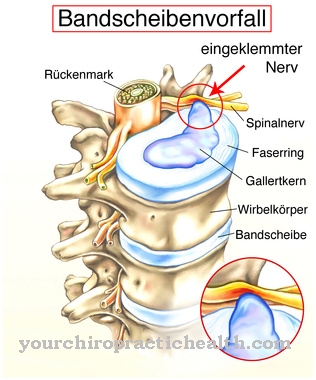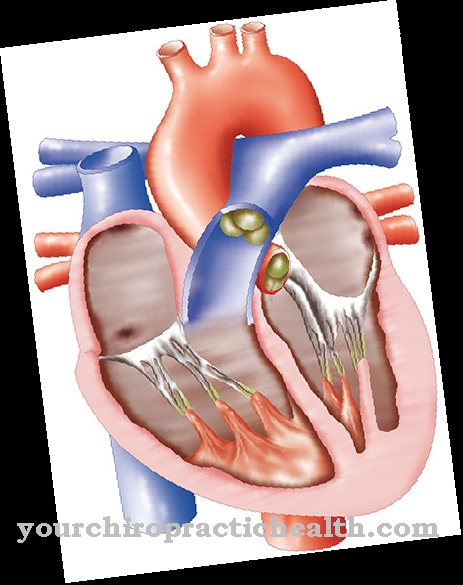The Herpes simplex encephalitis (short also HSV encephalitis) is inflammation of the brain caused by herpes simplex viruses. After a phase with unspecific flu-like symptoms, the patient shows characteristic neurological and neuropsychological symptoms as the disease progresses. With early treatment, the prognosis is good.
What is herpes simplex encephalitis?

© Kateryna_Kon - stock.adobe.com
Herpes simplex encephalitis is inflammation of the brain (encephalitis) caused by infection with herpes simplex viruses. Usually it is the herpes simplex virus type 1 (oral strain), very rarely herpes simplex type 2 (genital strain). The disease affects women as well as men.
It occurs most frequently between the ages of 20 and 30 and worldwide. The viruses have usually been latent in the body since childhood. In herpes simplex encephalitis, they enter the brain via nerve cords. There they lead to hemorrhages, necrosis (death of tissue) and swellings.
The result are characteristic neurological and neuropsychological symptoms that emanate from the respective focus of infection (so-called "focus symptoms"). With early treatment, the prognosis is good. If the inflammation also affects the meninges, doctors speak of herpes simplex meningoencephalitis.
causes
Herpes simplex encephalitis is based on an infection with herpes simplex viruses (mostly type 1). The first infection with the herpes simplex virus type 1 usually already takes place in childhood. The pathogen remains in the body unnoticed for a long time. However, he can become active again at any time and trigger the typical vesicular rash around the lips.
If the immune system is weak, the viruses can migrate through the nose via the olfactory mucosa and the olfactory nerves into the central nervous system. From there they go to the frontal lobes and temporal lobes of the brain. This usually happens first on one side and then on the other side as well.
Bleeding and necrosis as well as swelling around the affected brain area (cerebral edema) occur in the affected brain regions. This leads to the characteristic neurological and neuropsychological symptoms.
Symptoms, ailments & signs
Herpes simplex encephalitis is rapid and has several stages. Initially, the patient shows unspecific flu-like symptoms such as severe headache and high fever for a few days.
After a temporary improvement, the affected person shows psychomotor and psychological changes. Changes in behavior, confusion, disorientation and perception disorders can occur. Often the patient can no longer speak after a while (aphasia).
A slight paralysis on one side may develop. Epileptic seizures occur in over half of the cases. These are initially limited to one area of the brain (focal seizures), but can then spread to both hemispheres (generalized seizures).
In addition, there may be a painful stiff neck and clouding of consciousness. Coma can occur without treatment. If the intracranial pressure increases too much, the patient can die from it.
Diagnosis & course
Part of the basic diagnosis is an examination of the nerve water (liquor), which is obtained as part of a lumbar puncture. The nerve water is examined for certain values which, if they deviate, can indicate herpes simplex encephalitis. If necessary, it is also examined for the genetic material of the virus. However, it usually takes a few days before the result is available.
After about a week, the body produces antibodies against the herpes simplex virus type 1. These can then be detected in the blood and also in the nerve water. In addition to the nerve fluid examination, a CT (computed tomography) or MRI (magnetic resonance imaging) of the skull is performed. Necrosis and swellings can be seen in the MRI.
A CT is usually normal within the first few days when symptoms occur. An EEG (electroencephalography) can show evidence of damage in the affected brain regions. In the differential diagnosis, a septic sinus thrombosis (blood clot in the brain), a cerebral infarction and intracerebral haemorrhage (bleeding in the brain with a source of bleeding in the brain tissue) with accompanying infection can be excluded.
Herpes simplex encephalitis progresses rapidly in several stages. Since it is often fatal if left untreated, treatment must be initiated before a definitive diagnosis is made. If the disease is treated early, about 80 percent of patients survive.
Neurological sequelae such as memory impairment or paresis (paralysis) remain in around half of the survivors. Furthermore, there is an increased risk of permanent seizure disorders that originate in the region of the brain that was affected by herpes simplex encephalitis.
Complications
Herpes simplex encephalitis usually causes inflammation in the brain. This inflammation is recognized late because the first symptoms and symptoms are not particularly characteristic of the disease. If the herpes simplex encephalitis is not treated immediately, the patient may experience psychological and neurological impairments as the disease progresses.
The person concerned suffers primarily from fever and headache. Furthermore, the inflammation in the brain leads to a great deal of adeptness and changes in behavior. There are thought disorders and disorientation. The patient's actions are also severely restricted. Speech disorders continue to occur and the person concerned can no longer speak during the course of the illness. The quality of life is extremely reduced by the herpes simplex encephalitis.
As a rule, the patient is dependent on the help of other people because of the illness. Without treatment, there is a loss of consciousness and a coma. The victim dies if the intracranial pressure is not reduced. Treatment of herpes simplex encephalitis is not always possible. In most cases, the patient dies from the disease. Treatment with antibiotics may be possible, however, the course of the disease cannot be predicted.
When should you go to the doctor?
Even a classic herpes infection should be treated medically. The typical vesicular rash in the area of the lips requires diagnosis and therapy in order to avoid the development of herpes simplex encephalitis.
If you notice a headache, high fever, and other flu-like symptoms, the virus may have already spread to the central nervous system. In this case, the family doctor must be consulted immediately. If the symptoms recur after a temporary improvement, usually accompanied by psychological complaints, suspicion of herpes simplex encephalitis is likely.
A doctor's visit is indicated if behavioral problems, perception disorders or orientation disorders are noticed. One-sided paralysis, which is often accompanied by epileptic seizures, is typical of encephalitis. The emergency doctor must be called in the event of these complaints. At the latest when a stiffening of the neck is noticed, the disease must be clarified and treated by a doctor.
Herpes simplex encephalitis is a serious condition that can be fatal without medical attention. Therefore, the warning signs mentioned must be clarified quickly. Especially risk groups such as people with a weakened immune system should see a doctor immediately with the signs of HSV encephalitis.
Doctors & therapists in your area
Treatment & Therapy
Since 70 percent of patients die if left untreated, therapy with acyclovir must be initiated immediately if there is a justified suspicion of herpes simplex encephalitis. This also applies if the pathogen has not yet been unequivocally identified at this point in time. Acyclovir stops the herpes simplex viruses from multiplying.
In the event that the brain inflammation is not due to the herpes simplex virus, but rather a bacterial disease, a broad-spectrum penicillin is first given. The brain edema is treated with osmotherapy. A highly concentrated sugar solution is fed to the patient, which binds water from the edema due to osmosis.
The epileptic seizures are also treated with medication. Further therapeutic measures depend on the patient's condition, what other symptoms he is suffering from and what other findings the examinations reveal.
Outlook & forecast
In contrast to bacterial meningitis, brain infection by viruses tends to be associated with lower mortality. However, there is a risk of relapses again, as the affected virus can implant itself in the body and break out again after a period of rest.
The quickest possible treatment decides on the chances of recovery from encephalitis. The very aggressive herpes simplex virus poses a great danger to life and limb if left untreated. Statistically, around 70 percent of patients succumb to the consequences of the disease, unless treatment is timely. An exact identification of the pathogen and appropriate medication increases the probability of survival considerably. Although around 80 out of 100 patients recover, this does not prevent the risk of consequential damage.
The risk of TBE viruses is significantly lower with a 98 percent chance of recovery. Consequences of encephalitis caused by herpes viruses often impair the daily life of former patients. Cognitive limitations and manifesting muscle weakness are particularly common in severe cases.
Children tend to develop a water head and suffer additional hearing damage. Depending on the area affected, personality changes can be seen in those affected. A particularly risky course is pending with a permanent tendency to convulsions (status epilepticus). The spontaneous occurrence of brain edema is also life-threatening.
Such consequences make successful therapy extremely difficult and require long-term follow-up care for the patient. The earlier the disease is recognized, the more likely it is that there will be no long-term complications. A complete recovery without brain damage is then possible.
prevention
While many other encephalitis pathogens can be vaccinated, this is not possible with herpes simplex viruses. Nor is there any other drug treatment that can prevent the virus from breaking out again after the initial infection. A strong immune system is considered the best protection. This is supported by a healthy lifestyle with a balanced diet and physical activity.
Aftercare
When it comes to follow-up care, it is crucial that it begins as soon as possible. In the initial phase the patient is still very weak and powerless and has great difficulty sitting himself. The exercises by occupational therapists and physiotherapists are adapted to this situation and the patient is encouraged slowly and in a targeted manner. As the person concerned increases their mobility, the intensity and duration of the exercises increase.
It is important that the patient performs small exercises himself outside of the therapy sessions and does not allow himself to be discouraged by the lack of strength. Under certain circumstances, additional psychotherapy can help to develop the necessary patience for yourself and your body and to act with a lot of mindfulness and an iron will.
Even after discharge from the hospital, both physical and occupational therapy must be continued, with the aim that the patient can cope with his own everyday life on his own as soon as possible. As soon as this intermediate goal has been achieved, the next step can be to restore the patient's ability to work in order to restore the patient's financial independence.
There is no fixed schedule for rehabilitation. The patient decides together with the attending physician when the personal goals set will be achieved and when the person affected can get along without outside help.
You can do that yourself
In the case of herpes simplex encephalitis, there are no options for self-help apart from the medical options for therapy. There are no alternatives to immediate medical treatment for this disease. Nevertheless, the quality of life of survivors after herpes simplex encephalitis can be significantly increased by certain measures.
Those affected can find help in this regard primarily in self-help groups that are available in various larger cities, but also in social networks. There are also a number of books on the subject of herpes simplex encephalitis and living with the long-term effects of such a disease, most of which were written by those affected. Helpful experience reports can also be found in various Internet forums.
In many cases, survivors of herpes simplex encephalitis suffer from cognitive deficits such as memory disorders or behavioral problems. Family members of those affected must show special understanding in this situation.
They can help by including those affected in everyday life and by challenging them physically and cognitively as much as possible. Apart from further treatment and therapy of the long-term effects of herpes simplex encephalitis, psychotherapeutic help can also be used.












.jpg)



.jpg)










.jpg)
